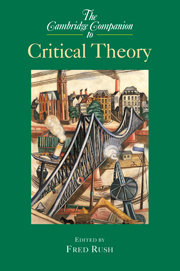Book contents
- Frontmatter
- Introduction
- 1 Conceptual foundations of early Critical Theory
- 2 Benjamin, Adorno, and the decline of the aura
- 3 The dialectic of enlightenment
- 4 The marriage of Marx and Freud
- 5 Dialectics and the revolutionary impulse
- 6 “The dead speaking of stones and stars”
- 7 Critique, state, and economy
- 8 The transcendental turn
- 9 The politics of Critical Theory
- 10 Critical Theory and the analysis of contemporary mass society
- 11 Critical Theory and poststructuralism
- 12 The very idea of a critical social science
- 13 A social pathology of reason
- Select bibliography
- Index
1 - Conceptual foundations of early Critical Theory
Published online by Cambridge University Press: 28 May 2006
- Frontmatter
- Introduction
- 1 Conceptual foundations of early Critical Theory
- 2 Benjamin, Adorno, and the decline of the aura
- 3 The dialectic of enlightenment
- 4 The marriage of Marx and Freud
- 5 Dialectics and the revolutionary impulse
- 6 “The dead speaking of stones and stars”
- 7 Critique, state, and economy
- 8 The transcendental turn
- 9 The politics of Critical Theory
- 10 Critical Theory and the analysis of contemporary mass society
- 11 Critical Theory and poststructuralism
- 12 The very idea of a critical social science
- 13 A social pathology of reason
- Select bibliography
- Index
Summary
Critical Theory first develops during a period of extraordinarily complex intellectual activity in Germany. If one were to take the year 1930 as a benchmark - when Max Horkheimer becomes the director of the Institute of Social Research in Frankfurt - and were to look back upon the decade preceding that date, one would encounter in their most vibrant forms many of the most important philosophical movements of the twentieth century: the hermeneutic phenomenology of Heidegger; the logical empiricism of the Vienna Circle and the early Wittgenstein; various strands of neo- Kantianism; and the humanistic Marxism of Lukács. In political and social theory, psychology, historiography, and economics the situation is hardly less multifarious. Each of these views or schools, sometimes in combination with elements of others, vies for predominance in the Weimar period. Moreover, each of the contenders takes care to incorporate within it involved criticisms of the others.
- Type
- Chapter
- Information
- The Cambridge Companion to Critical Theory , pp. 6 - 39Publisher: Cambridge University PressPrint publication year: 2004
- 9
- Cited by

